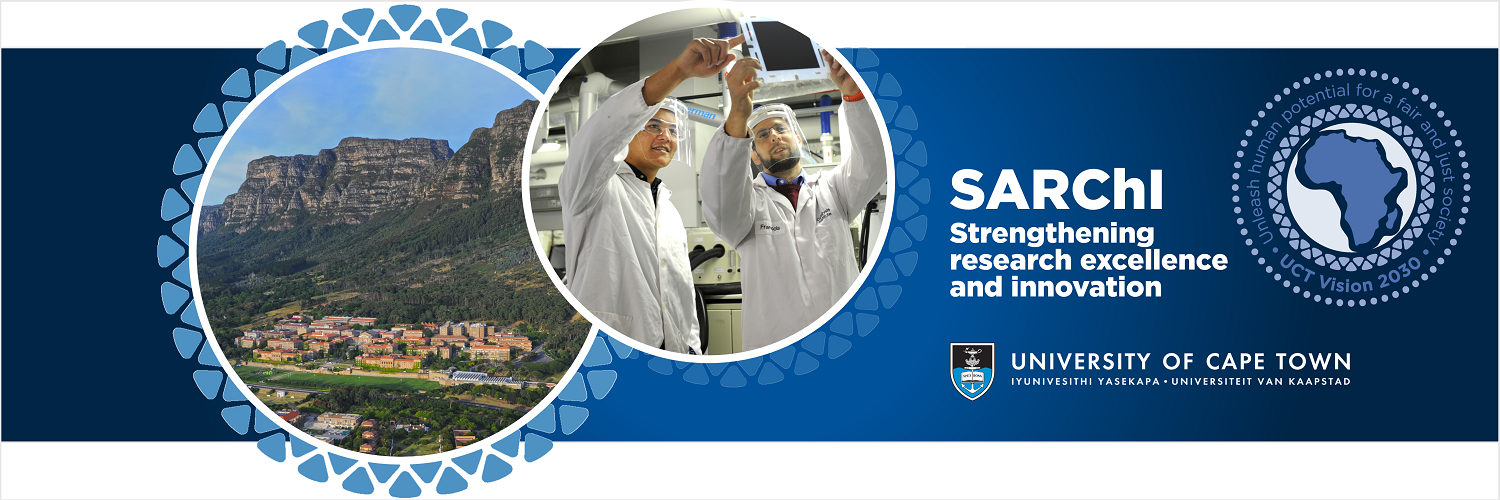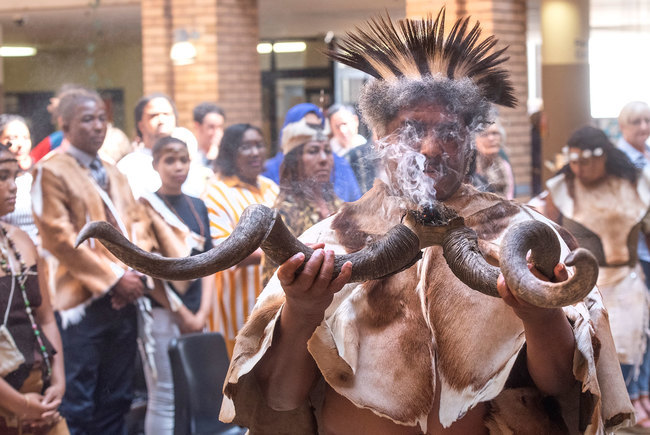Blue skies: UCT SARChI Chair leading in the global aviation industry
09 November 2023 | STORY NATALIE SIMON. PHOTO SUPPLIED. Read time 8 min.
Professor Arnaud Malan and his team use computational fluid dynamics (CFD) to support Airbus in their aircraft design. But CFD has wide applications and potential to grow the manufacturing industry in South Africa and decarbonise the aviation industry.
If you find yourself traveling on an aircraft built by Airbus, chances are good that the airplane was designed using software from the University of Cape Town (UCT). Professor Malan is South African Research Chair (SARChI) in Industry Computational Fluid Dynamics based in the Mechanical Engineering Department at the Faculty of Engineering and the Built Environment. His group has been working on CFD and its application in the aerospace industry. They use applied mathematics and computational modeling to simulate aircraft design.
“I have always been passionate about the aerospace industry,” said Professor Malan. “And I used to dream of working in that space when I was younger. It is a happy coincidence that my other passions, mathematics and computer science, allowed me to achieve that dream.”
For Malan, this was achieved through a combination of hard work and perseverance, as well as being at the right place at the right time. His collaboration with Airbus started through a chance meeting at a Stellenbosch wine farm 15 years ago. He was attending a conference and a talent scout from Airbus, Dr Dale King, struck up a conversation with him.
“I was at the CSIR [Council for Scientific and Industrial Research] back in those days, but this meeting and the funding that came from it, was the catalyst that started the work I am still busy with today as a SARChI at UCT,” said Malan.
While his group has a strong relationship with Airbus, it is by no means exclusive. When designing a new aircraft the Airbus company reaches out to Malan’s group to request CFD software to calculate how specific elements of the aircraft will cope in flight.
“Where it gets highly competitive is that Airbus reach out to all our competitors too,” said Malan. “They only take the best software.”
Malan’s group outperforms their competitors. He attributes this success to the South Africa’s diversity.
Our diversity is a blessing and a strength. If you embrace this you get a wonderful, innovative environment that gives us a strong competitive edge.
“I work with an incredible team of young, driven and fantastically talented students of all races and backgrounds in South Africa,” he said. “Our diversity is a blessing and a strength. If you embrace this you get a wonderful, innovative environment that gives us a strong competitive edge.”
Supporting the next generation achieve their dreams
Malan recognises that his dreams were achieved in part through the support of Dr King and his colleagues. Now much of his focus is on helping his students achieve their dreams too. His strong connections with the industry allow him to do this.
“One of my students, Dr Michael Wright,” said Malan, “has always dreamed of working for Airbus, but this is no easy feat for a South African. Through his own incredible hard work and perseverance supported by the relationship I have with Airbus, Michael managed to secure himself a post as a senior designer.”
Dr Wright is currently a Fluid and Thermal Development Engineer at the Airbus offices in Hamburg, Germany.
Wright says his time in the Industrial CFD research team taught him self-reliance, but also how to leverage the knowledge, creativity, skills and resources of the team around you to achieve more.
“It was also an incredible opportunity to be part of a global research project, which allowed me to be placed in the very centre of worldwide excellence and research in my field.”
But Malan stresses that he cannot take credit for the success of his students.
“I am continually impressed with the strong drive and determination I see in the students who come through my group. I don’t know if it is because of our history, or our socio-economic challenges but compared to the students I interact with in richer countries, I can’t help but be taken aback by the incredible hunger and passion of the students I work with.”
“They are so willing to dream and put in the hard work it takes to achieve those dreams.”
Another of Malan’s students, Prince Nchupang, is currently working on his PhD. He has secured a Junior Lecturer position in Applied Mathematics at Stellenbosch University. He came to the Industrial CFD group from another field but said the support he received from his supervisors and colleagues helped him through that difficult transition.
It was an incredible experience being part of a team that was recognised internationally for their sterling contribution to the aerospace industry.
“It was an incredible experience being part of a team that was recognised internationally for their sterling contribution to the aerospace industry,” says Nchupang.
What is tragic for Malan is how many of those talented students end up securing jobs abroad. Not necessarily because they want to leave, but because that is where their skills are in demand.
Working with local industry to grow the SA knowledge economy
Trying to stem the brain drain was a driver for Malan to create his spin-off company, Elemental Numerics.
“I am hoping that through the creation of this company we can retain some of our own talent and build a knowledge-based economy here in South Africa,” he said.
Malan sees a great deal of potential for CFD in South Africa’s local manufacturing industry, with applications ranging from cryogenic storage to any industry where there is liquid metal flowing. Next on his agenda is to build stronger contacts with local industry in South Africa and identify spaces where his group can add value.
Greening the aviation industry
The aviation industry is one of the most difficult industries to decarbonise. In a fast-warming world this is a serious issue. Airbus is focusing its efforts on using liquid hydrogen as a clean fuel source for its aircraft, and they are working closely with Malan and his team to try and achieve this.
“Part of the challenge,” said Malan, “is that liquid hydrogen is an unstable fuel. It needs to be stored at minus 250 degrees Celsius, and the liquid in the aircraft’s tank needs to be very carefully monitored and managed.”
Hydrogen has great potential as a fuel that is both light and has a high concentration of energy. It is used in the space industry for these exact reasons, to power rockets or satellites. But it is not out of the ordinary to hear about a rocket or a satellite exploding every now and then, an accident that could come with heavy loss of life in the aviation industry.
“With aircraft often carrying human beings you naturally cannot afford even a single incident where lives are put at risk,” said Malan. “While there is huge potential in hydrogen to green the aviation industry, we need to get it 100% right. We hope to be a key part of the team that can make that happen.”
 This work is licensed under a Creative Commons Attribution-NoDerivatives 4.0 International License.
This work is licensed under a Creative Commons Attribution-NoDerivatives 4.0 International License.
Please view the republishing articles page for more information.

South African Research Chairs Initiative (SARChI)
The South African Research Chairs Initiative (SARChI) recognises research leadership and excellence in the country. The initiative was established to support research leaders who will develop the next generation of scholars while engaging in and driving research to advance disciplines – while also leveraging their research to contribute to addressing the intractable challenges plaguing our communities. Many UCT-based SARChI Chairs have contributed towards the production of innovative, impactful, cutting-edge research premised on knowledge generation and building capacity. The programme was initiated and funded by the national Department of Science and Innovation (DSI) and the National Research Foundation (NRF).
“The Chairs have enabled, and will continue to enable, us to fulfil our mission of fostering connections and promoting collaborations that highlight the continent's research talent and the significant contributions of African researchers to the global knowledge project. Since inception, the work of the SARChI Chairs at UCT has vividly showcased the pioneering research stemming from Africa, pursued across UCT’s Vision 2030 strategic research focal areas, the UN Sustainable Development Goals and, importantly, the African Union’s Agenda 2063.”
– Professor Jeff Murugan, Acting Deputy Vice-Chancellor of Research, and Internationalisation at UCT
See full list of UCT SARChI Chairs
“Every research initiative led by the SARChI Chairs at UCT embodies a sincere dedication and unwavering commitment to addressing global challenges. Additionally, they demonstrate that cutting-edge interdisciplinary and deep disciplinary research is being pursued in Africa.”
– Dr Linda Mtwisha, Executive Director of Research at UCT
Related articles



















